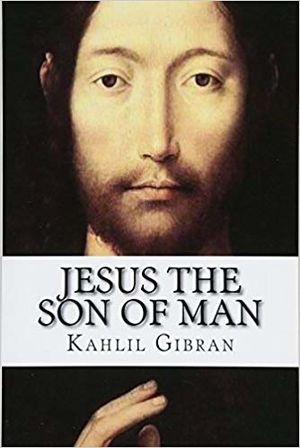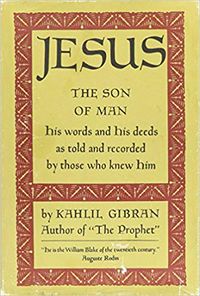(++) Jesus, the Son of Man (1928 Gibran), poetry
Jesus, the Son of Man (1928) is a poem by Kahlil Gibran.
Abstract
Jesus’ “words and deeds as told and recorded by those who knew him.” Jesus is presented as the incarnation of the very same moral principles Gibran had expressed in his major work, The Prophet (1923)—a poetic and philosophical work that has made him one of most read authors of all times.
"Barbara Young, the author of "This Man From Lebanon: A Study of Kahlil Gibran" said of this book, "I know now that the book will never be a book to me, but always a host of living entities, breathing and vocal. And not because of Kahlil Gibran, my well-beloved friend, but rather because of the livingness of Anna, the mother of Mary; of Matthew and the Sermon on the Mount; of Joseph of Arimathaea, reporting the words of Jesus; of Susannah of Nazareth, and her story of the Mother of Jesus; of Mary Magdalen, and of Cyborea, the mother of Judas. It is these who live upon the pages of this book, not the great man who loved them into being. Gibran has done his work supremely well. It has been done with single power by one fully conscious of the social and political and religious Palestine and Syria and Rome of that period, one who was at home in the richness and significance of the traditions and in the history and the language of the country of Jesus. The Aramaic that Jesus spoke was Gibran's other language. The atmosphere and the aspect of the Land of Judea is cast like a spell upon the reader who, moving through the scenes of those days and that country, is aware of far more than the words upon the printed page. We behold the Young Man of Nazareth as we have never beheld Him, for in this Jesus of Gibran's for the first time since the writings of the Gospels, a countryman of Jesus writes of his words and deeds." Here Jesus is portrayed through the words of seventy-seven contemporaries who knew him - enemies and friends; Syrians, Romans, Jews, Greeks, and Persians; priests, courtesans, publicans, and poets."--Publisher description.
Editions
Published in English in London and New York, NY: Knopf, 1928; and in French and Arabic in Lebanon and Egypt, would become an even greater international success after WW2, being translated in all major European and non-European languages.
External links
- [ Google Books]

